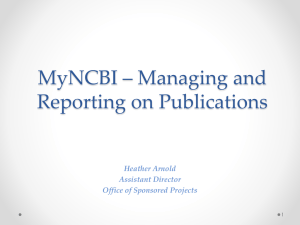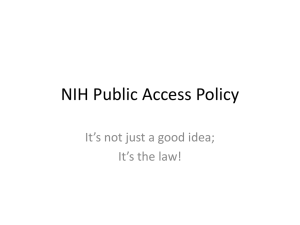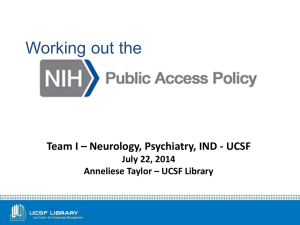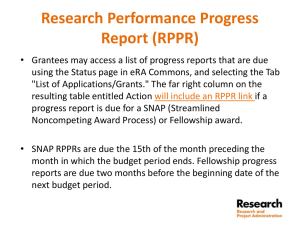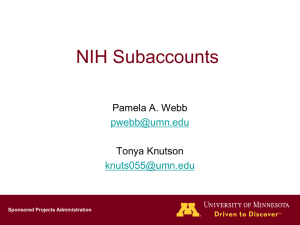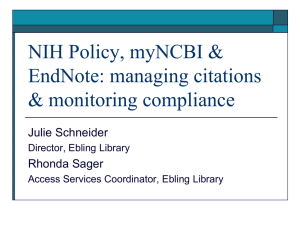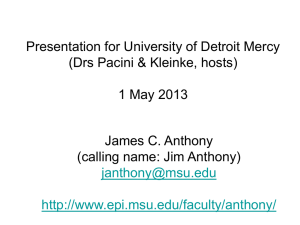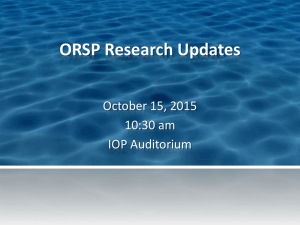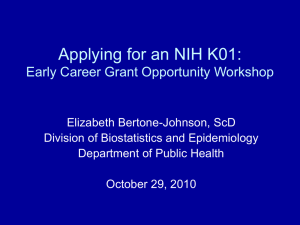Complying with the NIH Public Access Policy
advertisement
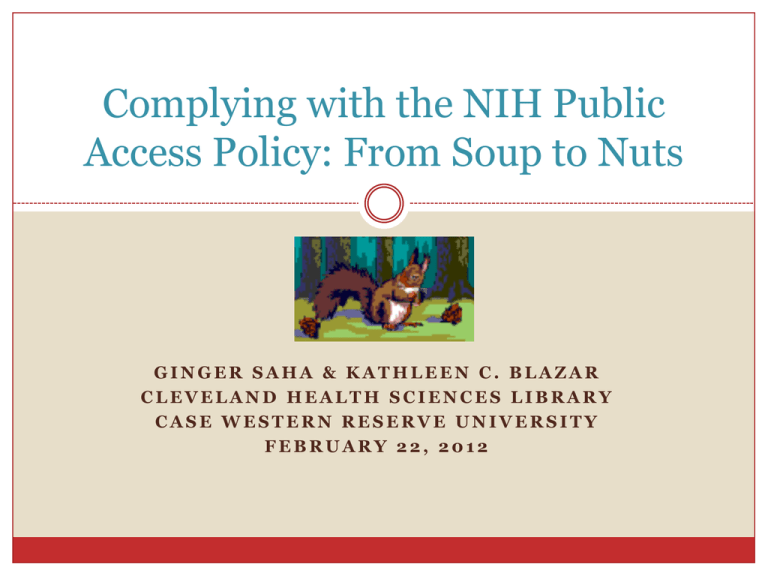
Complying with the NIH Public Access Policy: From Soup to Nuts GINGER SAHA & KATHLEEN C. BLAZAR CLEVELAND HEALTH SCIENCES LIBRARY CASE WESTERN RESERVE UNIVERSITY FEBRUARY 22, 2012 NIH Public Access Compliance Checklist Land the grant (Note the correct format of the NIH grant number – it is not your RES SpeedType! Write the paper and include on the manuscript all the numbers of all the NIH grants that directly supported the research including salaries of study personnel on NIH training grants. Be certain that the journal in which you want to publish will deposit the published version of the article into PubMed Central, or will allow you to deposit the final peer-reviewed manuscript into the NIH Manuscript Submission System, for release no later than 12 months after publication. Link up the PMCID or NIHMS ID in all the required NIH and NCBI databases. Cite the article correctly in all future dealings with NIH. 2 The NIH Public Access Policy Is Mandatory The Director of the National Institutes of Health shall require that all investigators funded by the NIH submit or have submitted for them to the National Library of Medicine’s PubMed Central an electronic version of their final peer-reviewed manuscripts upon acceptance for publication, to be made publicly available no later than 12 months after the official date of publication: Provided, That the NIH shall implement the public access policy in a manner consistent with copyright law. Division G, Title II, Section 218 of PL 110-161 (Consolidated Appropriations Act, 2008) 3 Public Access Compliance Monitor 4 The PI-is-not-the-author problem. The following scenarios all cite the “author” as the one who has to work through the article publication and PMC / NIHMS deposit process. At Case, the PI is often not the “author.” In fact, the PI is often not even one of the co-authors. However, the PI is the one responsible for compliance all the way through the process, including linking up the PMCIDs to the grants. Communication between PIs and non-PI authors is critical!! 5 The PI-is-not-the-author problem. 6 How to Submit Manuscripts • Four different submission methods are available, which vary in: – Version posted – Use of the NIH Manuscript Submission System (NIHMS) – Role of Publishers – Role of Authors – Participating Journals • Authors may use the method that is most appropriate for them and is consistent with their publishing agreement. http://publicaccess.nih.gov/submit_process.htm 7 PubMed Central Submission Methods 8 Submission Method A 9 Submission Method B or Method D 10 Submission Method C – author uses NIHMS Submitting a final peer-reviewed manuscript to PubMed Central (PMC) via the NIHMS involves three tasks, as explained below. Task 1 may be done by an author or by someone in the author’s organization (e.g., an assistant or a librarian). Tasks 2 and 3 must by done by the author. Task 1: Deposit Manuscript Files and Link to NIH Funding Task 2: Authorize NIH to Process the Manuscript Task 3: Approve the PMC-formatted Manuscript for Public Display A Note on Timing: NIH awardees are responsible for ensuring that manuscripts are submitted to the NIHMS upon acceptance for publication and that all NIHMS tasks are complete within three months of publication. 11 NIHMS failures because the approval process stopped: 12 Congratulations! You have a PMCID. BUT, you are not done yet. You have to do all that linking… 13 Neil M. Thakur, PhD. Special Assistant to the Deputy Director, Extramural Research NIH wrote to us on 2/1/12: “When a PI sends us an annual progress report or a closeout report, they are essentially sending us a receiptthey are telling us how they spent the money. Including papers on those reports tells us that the grant funds were used to support that paper. All papers supported by the award, whether authored by the PI or not, need to be included. These reports are signed, and they are the only official documentation of that spending. “All other grant-paper associations, including acknowledgements in the text, and entries in NIHMS or My NCBI, are not official. ” 14 How to comply with the NIH Public Access Policy Many of the next slides have been taken from: Thakur N., Trawick B., Gibb S. The NIH Public Access Policy [Internet]. Bethesda (MD): National Institutes of Health; 2011 [cited 2012 Feb. 10]. 90 p. Available from http://publicaccess.nih.gov/public_access_training_region al_tampa_2011.pdf CHSL expresses its gratitude. 15 eRA Commons/ My Bibliography Integration From the new Awards View [$] in My Bibliography, eRA Commons users can: – See if their publications are compliant with the NIH Public Access Policy – Start the manuscript submission process – Associate their NIH extramural grant awards with their publications The Awards View is available only to Commons users with active grants in their portfolio who have linked their My NCBI account with their eRA Commons account. 28 My NCBI 17 NIH Login 18 Logged in at My NCBI 19 Logged in to My NCBI at PubMed 20 Send marked citations to My Bibliography 21 Add to My Bibliography 22 Click on Save 23 New items at My Bibliography – info at PubMed 24 My NCBI account 25 Manage My Bibliography 26 My NCBI at NCBI Bookshelf Some of the next information is from My NCBI Help [Internet]. Bethesda (MD): National Center for Biotechnology Information (NCBI); 2005-. http://www.ncbi.nlm.nih.gov/books/NBK3843/ 27 Sharing My Bibliography 28 Settings at My Bibliography 29 Edit Settings 30 Choose Public, Add a Delegate and Save 31 Delegates 32 Managing Compliance 33 Display Settings in My Bibliography To see whether your publications are compliant or not, go to My Bibliography and click the link “Manage My Bibliography.” From the “Display Settings” drop-down menu select “Award” view, and click the Apply button. The default sorting option with Award view is “Public Access Compliance” (as shown in the image below), however, you may select the sort option you prefer. When selecting “Award” under Grouping the citations associated with awards will be listed first. 34 Compliant Articles Journal articles that are compliant with the NIH Public Access Policy are marked with a green dot and have the PubMed Central citation Id (PMCID) number listed. In Process Articles newly submitted to the NIH Manuscript Submission system are considered in process and are marked with a yellow dot. Note that the NIHMS ID number is listed. In the example, there is no association to an NIH award. Click the link “NIH Funding” to add an award to this citation. Non-Compliant A red dot indicates that the article is noncompliant. The compliance process can be started by clicking on the red dot or “Citation not in NIHMS or PMC.” NIH funding information (award id) can be added at the same time through the pop-up wizard. N/A Articles that were Not Applicable accepted for publication prior to April 7, 2008 are not covered by the NIH Public Access Policy. These citations are marked as not applicable (this status is also automatically applied to citation types that are not journal articles, e.g., book chapters, patents, presentations). Not Applicable Citations must be added to My Bibliography and associated as Not Applicable. 39 Initiating Compliance 40 “Edit Status” The wizard helps users to begin a manuscript submission, link to a previously-submitted manuscript, or determine if their citation is exempt from the policy. In addition, users can associate their awards to their publications through the wizard. 41 Begin the submission process 42 Associating NIH awards to publications To associate multiple citations with NIH awards at once, select the citations you wish to associate to NIH awards and click the button. Choose the pertinent award(s) id (s) from the list presented to you, and click “Save.” Associate individual citations To associate individual citations with NIH awards, click the “NIH Funding” link and select the pertinent award(s) id (s) from the list presented to you, and click “Save & Close.” Articles with multiple grants Citations must be associated with all grants listed. This may involve multiple PI’s and multiple My Bibliography accounts. 45
